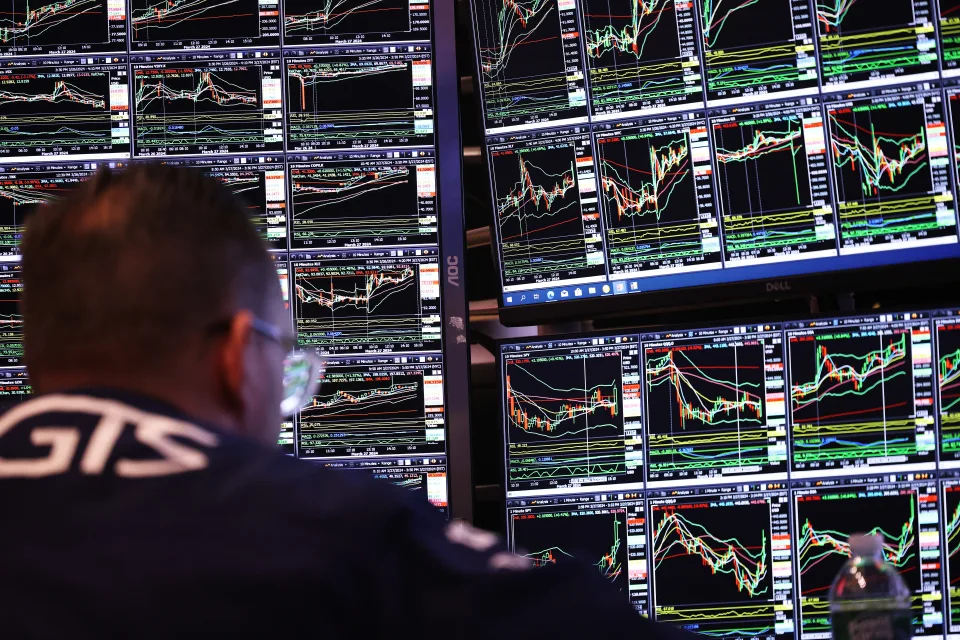
You probably shouldn’t take investing advice from Donald Trump.
In 2020, Trump famously predicted that “the stock market will crash” if Joe Biden became president. Biden did, and equity investors have since turned a handsome profit.
Since Biden took office, the S&P 500 stock index has risen a healthy 40%, capped by a five-month rally that kicked off last October and is still underway. At the same point in Trump’s presidential term, the S&P was up just 13%.
There’s a huge asterisk. Stocks did well under Trump until the COVID pandemic hit in February 2020. Through each president’s first three years, in fact, the Trump stock market outperformed the Biden market by about 5 percentage points.
The COVID pandemic, however, triggered a sharp stock sell-off in the first half of 2020 and a deep, though short-lived, recession. Trump loved to brag about the stock market and the economy during his time in office, but COVID left Trump with a damaged economy, contributing to his loss against Biden in 2020.
Of all the things affecting stock prices, presidential policies aren’t normally in the top five. So it might seem a bit silly to compare stock market returns under the two presidents, who are heading toward a 2020 rematch in this year’s presidential election.
Except that Trump himself takes credit when stocks go up, even when he’s out of office. While he was president, Trump bragged repeatedly when stocks rose, attributing the gains to his own policies. Earlier this year, three years after leaving office, Trump even claimed that stocks were rising because he was leading Biden in polls and investors were betting on another Trump presidency that would be starting 12 months hence.
Back in 2020, Biden dinged Trump for his stock market boasts, arguing that Trump was playing up gains for the investor class that ordinary working people didn’t get to enjoy. But even Biden now likes to remind voters that “the stock market going strong is a sign of confidence in America’s economy.”
Rising stocks certainly are bullish for the US economy, and they should be bullish for the incumbent president. More than 60% of Americans own stocks — mainly in their retirement accounts — and when investing accounts rise in value, a “wealth effect” makes people more optimistic and more likely to spend money.
Broadly speaking, US stocks normally rise over time as long as the economy is growing. Presidents, however, don’t have as much of an impact on stock values as the public or even the presidents themselves might believe. Federal Reserve monetary policy is often the biggest force pushing stocks up or down, along with economy-wide trends that presidents can’t necessarily control.
Amid the Great Recession in 2008 and 2009, the Fed embarked on novel and potent forms of monetary easing that undergirded stock gains for much of the next 11 years. The Fed tried to back away from those policies at the end of 2018, and stocks swooned. The Fed eased up.
When COVID hit and stocks sank in 2020, the Fed went straight back to its quantitative easing playbook. Congress also passed massive amounts of fiscal stimulus in 2020 and 2021. The combo helped stocks stage a quick recovery in 2021 and brought the US economy out of the COVID recession faster than any other advanced nation.
As inflation intensified in 2021 and 2022, the Fed had no choice but to start raising interest rates, which tends to depress stock gains because borrowing becomes more expensive and corporate profits are harder to come by. After a nice run-up in 2021, stocks fell in 2022, bottoming out in October of that year. The S&P 500 sawtoothed upward for about a year as investors half bet and half hoped that the Fed’s inflation battle would succeed. By last fall, it appeared that inflation was abating and the Fed’s rate hikes were finished, helping trigger the current rally.
On paper, Biden’s favored policies ought to be a negative for stocks. He favors a higher corporate tax rate and signed into law a modest increase in taxes on big companies in 2022. But Congress couldn’t pass the rate hike Biden called for and other tax hikes simply haven’t dented corporate profits enough to depress stocks.
There’s no sign, however, that voters are rewarding Biden for a roaring stock market or for a relatively healthy economy, either. His approval rating sank in 2021 and 2022 as inflation was worsening, but it hasn’t recovered even though inflation is nearly back to normal levels. Many Americans complain that most of the price hikes in food, rent, and staples are still there, even if the overall rate of inflation has dropped.
With Biden and Trump neck-and-neck in polls, Biden is likely to highlight every possible thing that might make voters feel a little more comfortable giving him another four years in the White House. Biden didn’t run for president the first time on a desire to enrich investors, but now that it’s happened, why not make sure people know about it?
The only risk, as Trump ought to know, is that a president can’t do much to stop a reversal if that’s what the market decides to do. And then you have some awkward explaining to do.





























